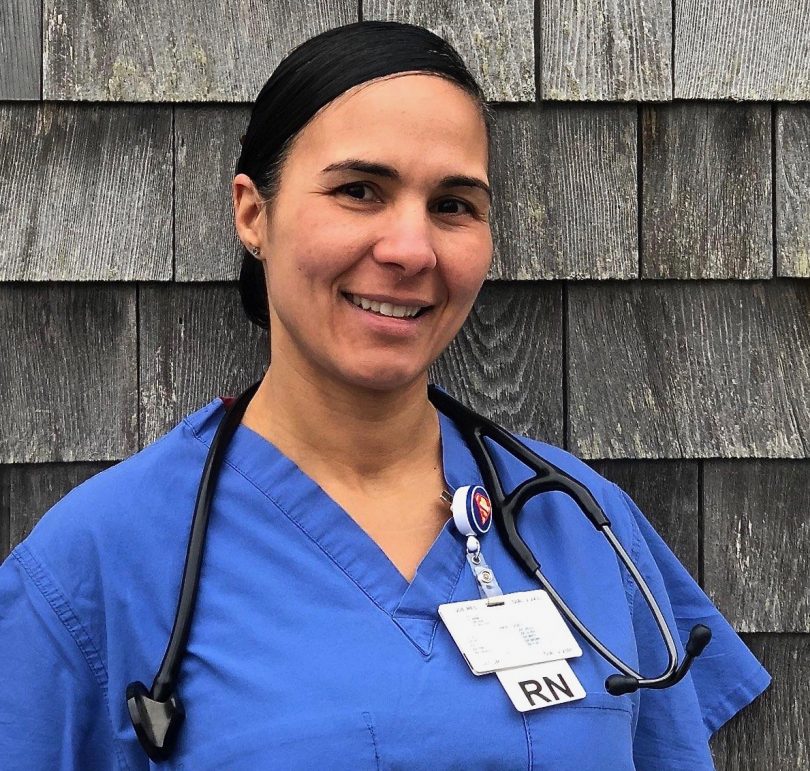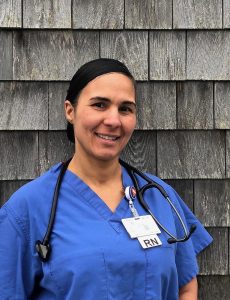HYANNIS – “I’m doing okay,” said Bette Texeira, a registered nurse in the critical care unit of Cape Cod Hospital. “The week has been as expected, pretty hectic and extremely busy,” she said.
Texeira, 47, of Mashpee first updated Cape Cod Wave Magazine on March 24 about the situation inside the hospital. She is a registered nurse who has worked for Cape Cod Hospital for 26 years, the last seven in the critical care unit.
Texeira has agreed to give weekly updates, when she has time, to Cape Cod Wave Magazine on what is happening in the hospital and specifically in the ICU during the Covid-19 pandemic.
“Our curve has definitely spiked,” she said. “I think we’ve done a really good job of flattening the curve. But we’re nowhere near where we could be.”
“We had our first Covid patient walk out of the hospital this week. He just kind of fell into his wife’s arms,” she said, describing a heartwarming scene staff witnessed from hospital windows.
“He had been on a ventilator for two weeks,” she said of the patient recently released. “He was extremely sick.”
While Texeira called herself an optimist by nature, she said, “The hospital is preparing us daily for a huge spike in patients.”
“Our numbers have pretty much quadrupled since we last spoke,” she said. “A lot of patients that initially tested positive and were managing their symptoms at home, those symptoms have worsened and some have needed hospitalization, and some of those have needed critical care,” said Texeira.
After a few days off, Texeira has worked 12-hour days for eight straight days before getting more days off, she said.
“When this all started, all of us were very optimistic,” said Texeira. “We were in preparation mode,” she said. Hospital staff, she pointed out, is always in preparation mode for things to change in an instant.
Without a pandemic, she said, “At any given time, a patient could require a different level of care,” said Texeira.
“So we’re always on alert,” she said.
“I’m a very optimistic person, so this is not something we can’t handle,” she said. “This is what we’ve trained for, what we prepare for.”
And yet, said Texeira, beyond the increased volume of patients, the level of care required while dealing with the many restrictions around the virus is different.
“There is a a lot of emotional care, physical care, and critical care, and we are also dealing with the absence of families who are usually advocating for them,” she said. “And the family members, most of them are home sick.”
“I was definitely not ready for that, and it definitely hits a different chord,” said Texeira.
“The toughest part for all of us is being able to provide good care as well as emotional care,” she said. The emotional care part of it, she said, “is affecting a lot of us the most.”
“We’re trying to communicate with patients who are intubated, some of them who are so ill their life expectancy is not good,” she said. “We’re also trying to provide cultural care. End of life care with a priest or whoever.”
“We’re trying to get all that done with a telephone call in intensive care where you have to be full dressed from head to toe,” she said.
The family is “making all these decisions based on our assessment over a telephone call,” said Texeira.
“They are making decisions for patients that could be life-changing. Do they continue life support? Do they continue invasive procedures?” said Texeira, as two examples of decisions family members are making for patients over the phone.
These intense conversations are not on Facetime or any such video chat, she said. They happen over a phone call. “They can barely hear us. Our voices are muffled,” she said.
The reaction of family members to hospital staff, she said, is, “They are grateful.”
It is hard for everyone, she said. “I’ve seen some nurses just break down in the break room and start crying,” she said. “It’s very difficult to see these patients who need so much care and whose outcomes may not be good,” she said.
In ICU, she said, “there are three people taking care of them. Sometimes four people are in the room all gowned up in all the equipment.”
“Cape Cod Healthcare is looking at our numbers daily and making plans for bed availability and nursing availability,” said Texeira. “We’ve hired several critical care travel nurses. And we’ve turned a 25-bed critical care unit into an 88-unit critical care unit.”
Other sections of the hospital have “also been dedicated to Covid patients, and we’re trying to separate them and keep them from other patients,” she said.
Personal Protective Equipment [PPE] is required for all hospital staff who interact with Covid-19 patients, whether in critical care, or a lower level of care, she said. This includes those awaiting a test, she said.
“We’re very grateful to have them [PPE],” she said. “We’re wearing this PPE at least nine or 10 hours during the shift.”
“I’m feeling confident about the equipment,” she said. “We’ve had a lot of donations. An ice hockey company, Bauer, of New Hampshire, has transitioned from making hockey equipment to making protective masks.
Some of those Baur masks have been delivered to Cape Cod Hospital, said Texeira. “That’s been huge. It’s made us feel very safe,” she said.
“The community has been amazing,” said Texeira. “I know these small businesses are suffering as well, but it doesn’t stop them from sending free stuff, coffee, food, donations. One gas station was offering free gas to health care workers,” she said.
The staff of the hospital has pulled together as well, she said. “We depend on our nursing assistants, respiratory therapists, housekeepers, everyone. Everyone is pulling together.”
As for the public, Texeira said that the best thing people can do is stay home.
“We literally are fighting this as best as we can. We can’t do it and keep the community safe if people don’t stay at home and keep our community safe,” she said.
“We’ve definitely seen a spike,” she said. “One of the big problems,” she said, is that people who normally come as very welcome tourists during a typical year have been coming to the Cape during the pandemic to get away from other places.
Asked how many patients are Covid-19 positive recently arrived from other places, Texeira the number was “significant enough.”
As for herself, Texeira said, “I don’t want to sound like a non-alarmist, but I am not really concerned. I feel we are taking all the proper precautions.”
The bigger concern, she said, is for her family, whom she cannot see. “I can’t go to the home of my compromised mother, who is battling cancer,” she said.
As hospital staff, she said, “We don’t have our support system. We don’t want to be around them because we don’t want to get them sick. So we depend on each other right now.”
EDITOR’S NOTE: Texeiria has agreed to check in with Cape Cod Wave Magazine with approximately weekly updates – when she has time. We wish her and the staff at Cape Cod Hospital safety, and we think we are not alone in saying thank you to all health care workers working on the front lines of this crisis.
– Please like us on Facebook.
For our other coverage see Cape Cod Covidispatches
–PLEASE SEE You Can’t Sell Right Field, a novel from Cape Cod Wave…. about land for sale, a crooked developer, a softball team named The Townies, and an election. Based on the true story of a Cape Cod development from the early 1990s, and Cape Cod softball.


































Thank you, Ms. Texeira, for taking the time from what must be an exhausting schedule to keep us updated. My hope is that by sharing this on our community Facebook pages, eventually the irresponsible, selfish and entitled knuckleheads out here will finally “get it” that this is not a drill, and they are not on vacation.
I hope they can use some basic communication supports with patients. 😥https://www.patientprovidercommunication.org
I am so proud to call this extraordinary woman my family. She has a heart filled with love and she is in the right place – saving lives. I love you Bette June thank you and stay safe. We are all praying for you and all medical workers on the front line. 🙏😘